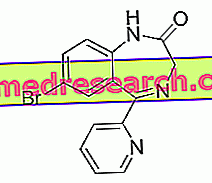Introduction
When we talk about the relationship between drugs and hair, we can refer to two very distinct situations: one in which we want to indicate all those drugs used to combat hair loss and another in which, instead, we want to indicate the drugs that can cause, or at least promote, hair loss.

Drugs against falling
The effectiveness of drugs dedicated to the treatment of alopecia (hair loss) depends on the causes that led to thinning. In general, these medicines produce results that are more satisfying the lower the severity of alopecia and the earlier they are taken. Among the "anti-fall" drugs approved by the FDA (Food and Drug Administration) - the American body responsible for assessing the safety of drugs and food - include pharmaceutical products such as minoxidil and finasteride.
Minoxidil
Minoxidil is used in the treatment of androgenetic and aerated alopecia. The first, also known as common baldness, is the most frequent form especially in men and is due to hormonal factors that add up to an innate genetic predisposition; it leads to a generalized and progressive "fall" of the hair, generally saving the nape and the lower part of the temples (areas available for an eventual autograft). In alopecia areata, on the other hand, we see a sudden hair loss confined to small roundish patches; the causes of origin, in this case, are different, with an important autoimmune and genetic component.
Minoxidil (Regaine®, Aloxidil®) is available in foam or 2 and 5% lotions, to be distributed on the scalp a couple of times a day; positive results can be registered after three or four months of regular treatment, but tend to disappear when use is suspended. For this reason, if satisfactory regrowth is not achieved after six months of regular use, the use of minoxidil may be suspended.
The most common side effects include skin irritation, itching, contact dermatitis, dry scalp and increased scaling.
Finasteride
Finasteride (Propecia®) is a fall protection drug approved for the treatment of androgenetic alopecia. It is taken in the form of tablets and in a good percentage of cases it stops the fall, stimulating the regrowth of hair produced by follicles not yet completely atrophied. Also in this case, the beneficial effects become evident after about 12 weeks, and are subject to the regular and constant use of the product.
The drug works by inhibiting the conversion of testosterone to dihydrotestosterone especially at the level of the hair follicles, eliminating an important risk factor for baldness.
Finasteride is also well tolerated by the patient and the rare side effects mainly affect the sexual sphere, with a slight decrease in desire, erectile dysfunction and reduced ejaculate volume. The use of finasteride is strongly contraindicated in women of childbearing age, due to the serious damage it can cause to the male fetus.
Corticosteroids
Also corticosteroids are used as drugs against hair loss, in particular, in the case of androgenetic alopecia and alopecia areata.
Except for particularly severe cases in which they are administered orally or parenterally, corticosteroids are administered topically in the treatment of alopecia.
Their use against hair loss is justified by their anti-inflammatory and immunosuppressive properties.
Among the active ingredients most used in this area, we mention betamethasone (Ecoval®) and triamcinolone (Kenacort®).
When used topically, the main undesirable effects caused by the aforementioned active principles are skin irritation, burning and / or pain at the site of application.
Other drugs
Among the other drugs that can help in the fight against hair loss, we mention dutasteride (which acts in a similar way to finasteride), ketoconazole (a drug for the treatment of fungal infections that also slows the synthesis of dihydrotestosterone on a par of the previous one), the ciclosporin and the antraline (used in the treatment of alopecia areata), the azelaic acid and the estrone sulfato (employed in the treatment of female androgenetic alopecia).
Drugs that promote fall
Several drugs can cause temporary hair loss, amplify the existing problem or even cause permanent baldness. Leaving aside the medicinal preparations (chemotherapy) and the techniques (such as radiation therapy) used in the oncology field, among the drugs that can cause or accelerate hair loss we recall:
- Isotreonin and other drugs derived from vitamin A (used mainly in the treatment of acne).
- Warfarin (Coumadin®) and heparin injections (oral and non-oral anticoagulants).
- Clofibrate and gemfibrozil (lipid-lowering agents, useful for lowering cholesterol and triglycerides).
- Anticonvulsant.
- Various antidepressants, including fluoxetine (Prozac®) and imipramine.
- Amphetamines (sometimes used unconsciously to promote weight loss).
- Some antifungals.
- Beta-blocker antihypertensives, such as timolol, atenolol, metoprolol, nadolol and propranolol.
- Allopurinol (used in the treatment of gout).
- Anabolic steroids and hormonal therapies of various types (prednisone, testosterone and other androgenic hormones, TOS, birth control pills).
- Medicines for rheumatoid arthritis and NSAIDs, such as naproxen, indomethacin and methotrexate.
- Medicines for the treatment of thyroid dysfunctions.
- Drugs for the treatment of Parkinson's disease, such as levodopa.
- Antiulcer drugs such as cimetidine, ranitidine and famotidine.
Action mechanism
Each of the aforementioned drugs can cause, promote or accelerate hair loss with its own mechanism of action. In any case, they act by interrupting the natural growth cycle of the hair, favoring its fall.
The type of fall (telogen effluvium or anagen effluvium) caused by drugs depends on the active ingredient used, the dosage to which it is taken and the sensitivity of each individual to the same drug.
When to worry?
As mentioned, not all patients taking the aforementioned drugs may experience hair loss, as this phenomenon depends on a great variety of factors, including individual sensitivity to the drug used.
Generally, within a day, 40 to 120 hairs are lost; this is considered an absolutely normal phenomenon that is part of the normal life cycle of the hair.
On the contrary, when you are witnessing a very intense and marked hair loss, it is advisable to worry and to contact your doctor, or to immediately request a consultation with a specialist. In this regard, it is of fundamental importance to inform the doctor of your state of health, making it a participant in the drug therapies you are following (for more information: How many hairs fall in one day?).



